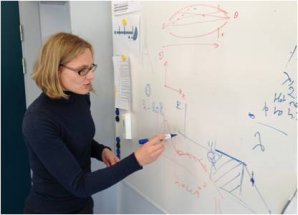Pascale Deen
Instrument Scientist at the European Spallation Source and Adjunct Associate Professor at the Niels Bohr Institute

Can you tell us about your studies and your scientific field?
Ph.D. Experimental Condensed Matter Physics,
University of Liverpool, England:
Exchange coupling and superconductivity in light rare earth alloys and superlattices.
I employed x-ray and neutron scattering techniques to understand magnetic coupling in artificial structures. In my post-doctoral years I became involved in heavy fermion systems and this led onto studies of frustrated magnetism, my current field of interest. These scientific fields are hugely evocative since many novel and exotic phases have been uncovered in recent years that push our understanding of condensed matter compounds.
What´s your Neutron-scattering background?
I performed my first set of neutron scattering experiments during my PhD as an integral part of the study to understand the nuclear and magnetic structures of artificial structures via neutron diffraction and reflectometry. I employed neutron scattering instruments at ISIS (UK), ILL (France) and HZB (Germany).
Beyond my PhD, as I become more interested in heavy fermion compounds, I delved into spectroscopic neutron scattering studies to understand the dynamic response of these compounds. I became the instrument scientist on the diffuse scattering instrument of the ILL, D7, after my Post-Doc, and this fuelled my interest in frustrated magnetism. D7 had recently undergone a renovation and I was involved in the installation and commissioning of the upgraded instrument. As such I became engaged in neutron scattering instrumentation and the possibilities that this yields for neutron scattering instrumentation. In my current role I shall be building a chopper spectrometer at the ESS that will bring forward neutron scattering possibilities in a whole range of scientific fields. In my adjunct role at Copenhagen University I shall continue to use neutron scattering to understand unusual magnetic order.
Can you describe step by step how you got to your position?
- Post-Doc ID20 European Spallation Source,
- Instrument Scientist, D7 Diffuse scattering spectrometer of the Institut Laue Langevin.
- Current position – see below.
Have you got any publications?
Yes, can be found on web of science.
What percentage of your time do you dedicate to your family/ work/ for you?
This is a very difficult question to answer since it varies hugely over time, even short periods of time.
However in general I am able to spend a considerable amount of time with my children both during the week (I am able to pick up at a reasonable time), weekends and in the holidays. This is possible by working with great flexibility so that it is very common for me to work in the evening when my children are asleep. I feel that this is an acceptable compromise and is a great advantage in academia. My time for me is at work since I enjoy my work. When things do get tough I like to go for a run.
Who or what is your mentor or greatest inspiration?
I am in awe of anyone who maintains a huge enthusiasm for their work throughout their career.
What is the most challenging thing you have faced in your career?
There are challenges on a daily basis in academic work. It is for this reason that I have chosen this career path. I haven’t found any challenges that I have not been able to overcome although sometimes it takes quite some time to do so.
On a personal level there have been several times when I expected huge challenges only to find that they have not arisen. This was particularly true when I was pregnant with my first child. I was deeply concerned that I would not be able to act as a local contact on a neutron scattering instrument and also be sufficiently present for my family. In fact the community were hugely supportive. By explaining my time limits to the team and collaborators everyone worked effectively within the time available.
Contact details
Pascale Deen
Instrument Scientist – Chopper Spectrometry
European Spallation Source ESS AB
P.O Box 176, SE-221 00 Lund, Sweden
Visiting address: Tunavägen 24 Lund
Adjunct Associate Professor
Niels Bohr Institute
University of Copenhagen
